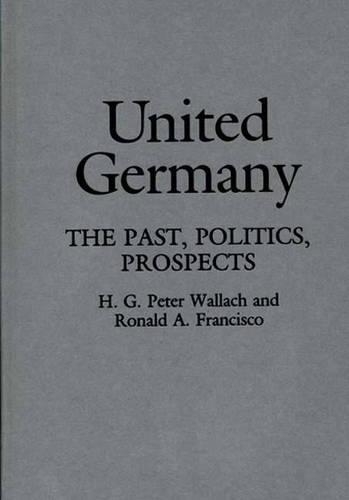
United Germany: The Past, Politics, Prospects
(Hardback)
Available Formats
Publishing Details
United Germany: The Past, Politics, Prospects
By (Author) Ronald A. Francisco
By (author) H G Pete Wallach
Bloomsbury Publishing PLC
Praeger Publishers Inc
30th July 1992
United States
Classifications
Tertiary Education
Non Fiction
European history
320.943
Physical Properties
Hardback
192
Description
This study describes the momentous events from 1989 to 1991 that led up to German unification, explaining how and why they happened as they did, and analyzing them in relation to issues in comparative and international politics and to current theories in political science. Two specialists, one on Western Germany and the other on Eastern Germany, who were observers there during the period, provide the background for understanding trends in German and European politics in the early 1990s. This text is intended for students of European contemporary history, comparative politics and international relations. The text links the current history of the peaceful revolution in Germany to an analysis of established theories in comparative politics. An introduction provides some historical background prior to 1989. The text goes on to define conditions in the two Germanies in 1989 and then launches into a discussion about the attitudes and expectations in the West as prospects for unity dawned. Careful attention is then given to the East German revolution and the March 1990 elections. Reasons are given for plans for the early unification of the two Germanies. Then the study focuses on the Federal Republic election of December 1990. The impact of these elections and the unification process on Germany and Europe and the world in the near future is discussed at some length. An appendix provides some basic information about Germany's system of government. A selected bibliography points to important primary and secondary sources.
Reviews
"The authors have skillfully pieced together a description of the momentous events in the former German Democratic Republic that started with peaceful demonstrations against the oppressive regime in 1989 and led to unification of the two Germanys one year later. In their excellent survey, the authors emphasize the rapidly changing political scene, but do not neglect economic and social factors. I recommend this book highly for those who seek to understand the recent dramatic developments in Germany and the crucial role it will play in world affairs in the coming years."-Gerard Braunthal Professor Emeritus, Political Science University of Massachusetts at Amherst
This timely book on the unification of Germany traces developments prior to that event in chronological fashion and addresses the following problems, inter alia: the consequences of 40 years of communism for East German political culture; the confusions arising out of the collapse of the Soviet Union and its satellite system; and the delicate relations between East and West Germans. There is a detailed discussion of the first free all-German elections, and the authors also deal with the relations of Germany with its neighbors, both in the context of NATO and the EC. They engage in interesting speculations about whether the "new Germany" will be democratic, whether it will be too powerful, and whether it will be a stabilizing or destabilizing force in Europe. The authors appear perhaps too optimistic about the "generational change" in Germany and about that country's "prudent monetary management" and responsible economic behavior (especially in view of its high interest rates). The apprehensions of Germany's neighbors, and the institutional consequences of unification are not given enough attention. But these are minor shortcomings. The book is coherent, clearly written, and well documented. Recommended for undergraduates and general readers.-Choice
"This timely book on the unification of Germany traces developments prior to that event in chronological fashion and addresses the following problems, inter alia: the consequences of 40 years of communism for East German political culture; the confusions arising out of the collapse of the Soviet Union and its satellite system; and the delicate relations between East and West Germans. There is a detailed discussion of the first free all-German elections, and the authors also deal with the relations of Germany with its neighbors, both in the context of NATO and the EC. They engage in interesting speculations about whether the "new Germany" will be democratic, whether it will be too powerful, and whether it will be a stabilizing or destabilizing force in Europe. The authors appear perhaps too optimistic about the "generational change" in Germany and about that country's "prudent monetary management" and responsible economic behavior (especially in view of its high interest rates). The apprehensions of Germany's neighbors, and the institutional consequences of unification are not given enough attention. But these are minor shortcomings. The book is coherent, clearly written, and well documented. Recommended for undergraduates and general readers."-Choice
Author Bio
H.G. PETER WALLACH is Professor of Political Science and Director of the European American Institute at Central Connecticut State University. He is the editor of West German Politics in the Mid-Eighties: Crisis and Continuity (Praeger, 1985). RONALD A. FRANCISCO is Associate Professor of Political Science and Soviet/East European Studies at the University of Kansas. He is the editor of The Political Economy of Collectivized Agriculture (1979), Agricultural Policies in the USSR and Eastern Europe (1980), and Berlin Between Two Worlds (1986).
